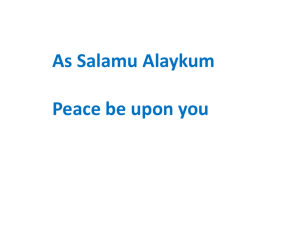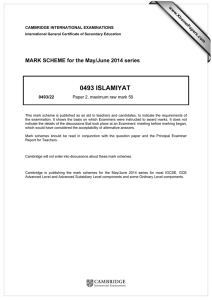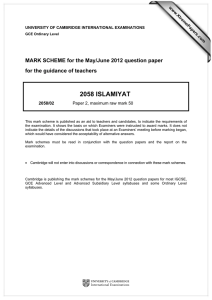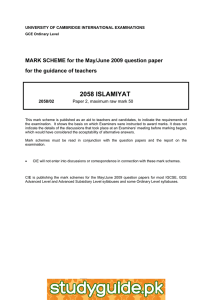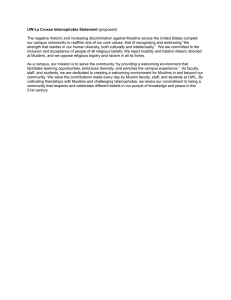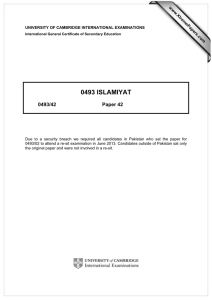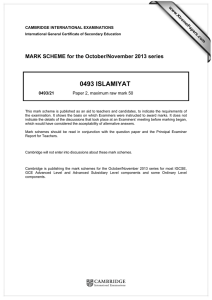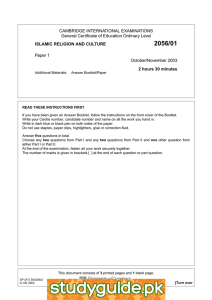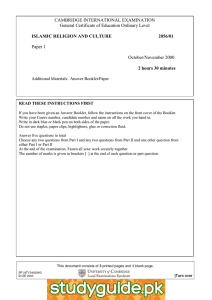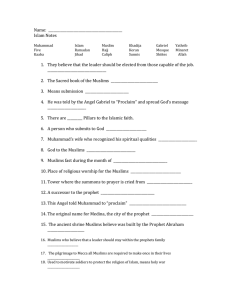0493 ISLAMIYAT MARK SCHEME for the May/June 2012 question paper
advertisement
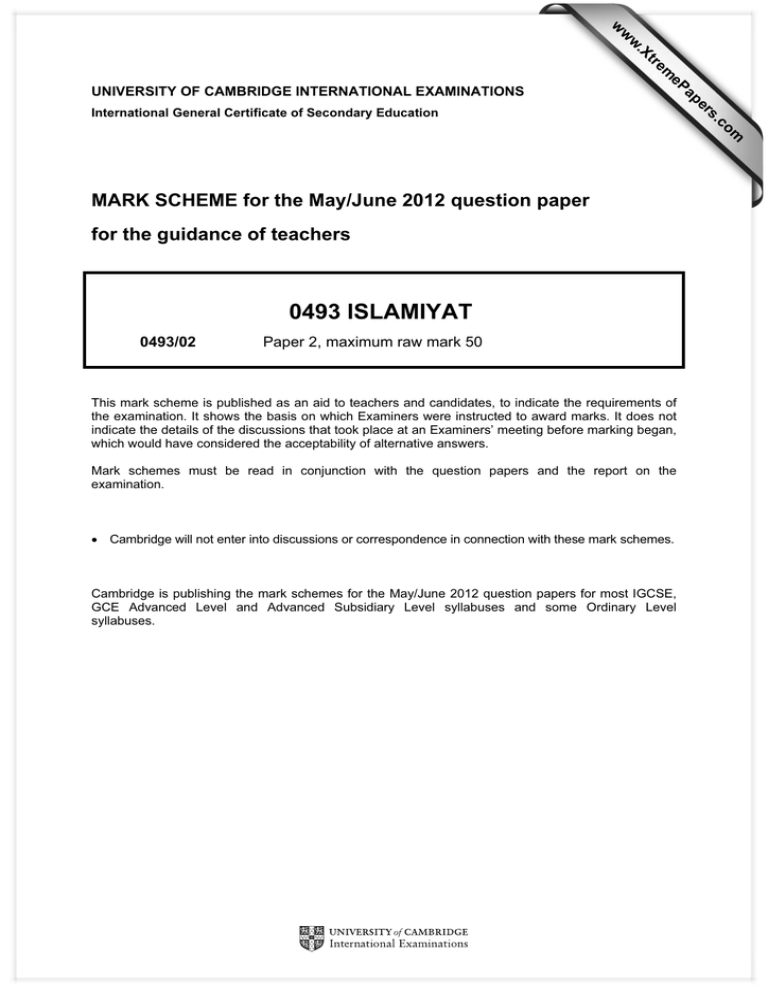
w w ap eP m e tr .X w UNIVERSITY OF CAMBRIDGE INTERNATIONAL EXAMINATIONS for the guidance of teachers 0493 ISLAMIYAT 0493/02 Paper 2, maximum raw mark 50 This mark scheme is published as an aid to teachers and candidates, to indicate the requirements of the examination. It shows the basis on which Examiners were instructed to award marks. It does not indicate the details of the discussions that took place at an Examiners’ meeting before marking began, which would have considered the acceptability of alternative answers. Mark schemes must be read in conjunction with the question papers and the report on the examination. • Cambridge will not enter into discussions or correspondence in connection with these mark schemes. Cambridge is publishing the mark schemes for the May/June 2012 question papers for most IGCSE, GCE Advanced Level and Advanced Subsidiary Level syllabuses and some Ordinary Level syllabuses. om .c MARK SCHEME for the May/June 2012 question paper s er International General Certificate of Secondary Education Page 2 1 Mark Scheme: Teachers’ version IGCSE – May/June 2012 Syllabus 0493 Paper 02 Choose any two of the following Hadiths, and (a) describe their teachings about what Muslims believe: [4] (b) explain how Muslims can put these teachings into action. [4] (i) Let him who believes in Allah and the Last Day either speak good or keep silent, and let him who believes in Allah and the Last Day be generous to his neighbour, and let him who believes in Allah and the Last Day be generous to his guest. (ii) God does not look at your forms and your possessions, but he looks at your hearts and your deeds. (iii) ‘Religion is sincerity.’ We said: ‘To whom?’ The Prophet said: ‘To Allah, his Book, His Messenger, the leaders of the Muslims and to their common people.’ (iv) No one eats better food than that which he eats out of the work of his hand. (a) (i) Candidates could simply state that belief in Allah and the last day are the hallmarks of being a Muslim. The more able candidates could stress upon the need to show care and generosity to those around in order to be a good Muslim. References to other Hadiths about the rights of neighbours and guests to show that Islam promotes good will to others can be cited here. (ii) The primary teaching of this Hadith is that actions shall be judged by intentions. God is not interested in a person’s wealth but with what is in their heart and this is an element of the Hadith that the more able candidates will discuss whilst bringing to the fore how a true Muslim’s conduct is the criteria of true faith. (iii) Some answers could simply explain the teachings of this Hadith by stating that Muslims must be loyal to God, the Qur’an and the Prophet. The more insightful answers will however discuss how Muslims need to not only understand the basic teachings of Islam and sincerely follow its five pillars but that they need to be sensitive to the needs of other people whilst being loyal members of their community. (iv) Muslims must take responsibility for earning a livelihood for themselves and their families. Importance is given to how one earns ones livelihood in Islam, rather than how much you earn. Lawful earnings through hard work are preferred by God whereas begging and reliance on others is strongly discouraged in Islam. © University of Cambridge International Examinations 2012 Page 3 Mark Scheme: Teachers’ version IGCSE – May/June 2012 Syllabus 0493 Paper 02 (b) (i) Muslims must follow the will of God and be generous and kind to people around them could be a possible answer, whilst other, better answers could go on to discuss the meaning and importance of generosity with reference to other relevant Hadiths. Good answers will also discuss how Muslims should hold others in high regard and be of service to them irrespective of who they are or what faith they follow. (ii) In all their actions Muslims should endeavour to seek God’s pleasure. Some answers may focus on how Muslims need to purify their hearts and their intentions and be concerned with acting with sincerity rather than appearing pious. Examples from daily life could be given here highlighting the importance of good actions. (iii) By following the teachings of Islam Muslims can put into practice the teachings of this Hadith. Some answers could say that a true Muslim will not only follow the Qur’an and the Prophet but will endeavour to maintain the good of society. Sincerity in all aspects of life should be the most important aspect of a Muslims conduct. (iv) A Muslim should support himself and his family through his own hard work. Good answers will point out that it is better to live humbly but within ones means rather than to earn unlawfully or on the hand outs of others. Examples from the Prophet’s life or the candidates own experiences and life can be given here. 2 (a) According to the teachings of the set Hadiths you have studied, outline the ways in which Muslims should treat one another. [10] A basic answer to this part of the question will refer to a few Hadiths without showing a confident understanding of their meaning and how they combine to give a general reflection on the rights of others in the community of Muslims. Better answers will give clear references to relevant Hadiths and attempt to understand and express their teachings. The Hadiths cited must be the ones from the syllabus as the question states this requirement clearly. Good answers will quote and discuss Hadiths and deduce from them the rights of others in the community of Muslims and go on to express them confidently. (b) What are the advantages of having different categories of Hadiths. [4] An evaluative response is required here, candidates could name the different categories of Hadiths and give reasons for why they think they are important or not important e.g. they can say that Hadith A-Daeef (weak) is a Hadith in which the narrator may have a bad memory or may have been known to be a liar or may not have met the one he was supposed to be narrating from. Some could even go on to discuss the harm that could result from following say a weak or an unauthentic Hadith. All valid answers should be credited. © University of Cambridge International Examinations 2012 Page 4 3 Mark Scheme: Teachers’ version IGCSE – May/June 2012 Syllabus 0493 Paper 02 (a) Write a descriptive account of the important events that took place in the caliphates of any two of the four Rightly Guided Caliphs. [10] In this answer candidates can choose to write about the important events that took place in the period of any two of the Rightly Guided Caliphs. The mark is not divided 5×5 between the two caliphs instead examiners must read the answer as a whole and marks should be awarded accordingly. For the reign of Abu Bakr candidates could write about the apostasy movement, the false prophets, the compilation of the Qur’an etc. From ‘Umar’s period they could write about some of the famous battles when the Muslim empire expanded greatly as well as mention his administrative reforms etc. From the caliphate of ‘Uthman candidates could talk of his contribution in preserving the Qur’an and also the expansion that took place during his reign. The disquiet that started and led to his assassination is also an important event that could be covered. During the reign of ‘Ali the battles of Camel and Siffin; the differences and arbitration between Mu’awiya and ‘Ali; the Kharijites movement are all worthy of mention. It is detail and development in the answer that will help candidates gain top marks. (b) Briefly state why any one event you have written about in part (a) was of special significance. [4] Once again a variety of answers could be given by the candidates. The candidates in this answer need to write their reasons for why the event they have written about in part (a) was important to the Muslims e.g. if they write about an event from the reign of ‘Umar they can state how the expansion strengthened the Islamic empire etc., boosted morale etc. rather than write about individual battles or each administrative reform. Good evaluation rather than repetition from part (a) should be rewarded. 4 (a) Give a detailed account of how Muslims prepare for prayer. [10] Candidates could mention some or all of the conditions of the prayers such as intention, timings, purity from both major and minor impurities, purity of the body, clothes, and place, sattar and facing the qiblah. It is the details that are given with each point together with supporting verses from the Qur’an and Hadith that will help candidates gain top marks. (b) ‘A mosque is a focal point in the lives of Muslims.’ Discuss. [4] Here candidates need to give their views on why they feel a mosque is of importance in the lives of Muslims. Candidates could give a range of views saying that it is a place of worship as well as a centre for political and social gatherings. The call for prayers are given from the minarets of mosques. Friday prayers, Eid prayers and funeral prayers can all be held in mosques. There is a greater reward for praying in the mosque. It serves as an educational centre for Muslims and is also a place of retreat etc. A few reasons could be given and discussed or many reasons could be given without going into too much detail. Better answers will show clear evaluation. Some candidates may have a different point of view and feel that a mosque is not the focal point in the lives of Muslims. All answers should be given due marks if they answer the question set. © University of Cambridge International Examinations 2012 Page 5 5 Mark Scheme: Teachers’ version IGCSE – May/June 2012 Syllabus 0493 Paper 02 (a) Outline the features of the Ramadan fast, and identify which Muslims are exempted from fasting during this month. [10] Candidates could simply say that the features of the Ramadan fast are: taking sehri before dawn and abstaining from eating, drinking, smoking and marital relations during daylight hours. They could add that the fast is broken at sunset. The better answers will give details such as making the intention to fast before sehri, breaking the fast with a date and water and attending tarawih prayers. Sitting in itikaf in the last days of Ramadan could also be mentioned and the need to carry on life as normal during the fast could be given. A list of Muslims who are exempt from fasting would include pregnant women, children, insane people, the sick and the very old, travellers and menstruating women etc. Please note that the marks are not to be divided equally between the two parts of the answer. The answer has to be read as a whole and given marks on detail and development. (b) What advantages does the fast of Ramadan bring to the Muslim community? [4] Here once again we are looking for evaluation and marks should be given for all valid points made e.g. it unifies the community, makes the rich realise the hardships of those less fortunate, zakat is normally given in this month, the charity given in this month earns the better off the respect of the poor. The economy flourishes as money is circulated etc. and the community prospers. © University of Cambridge International Examinations 2012
